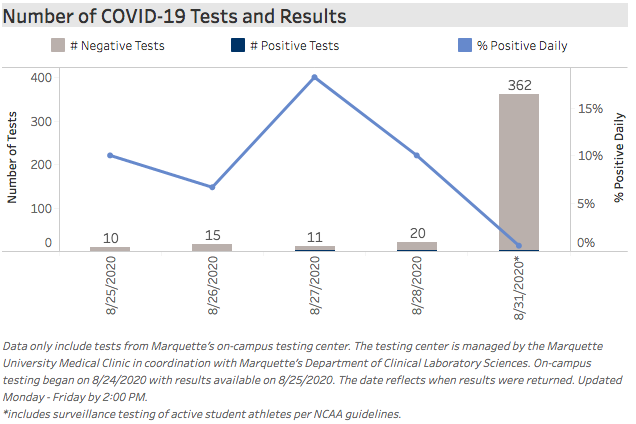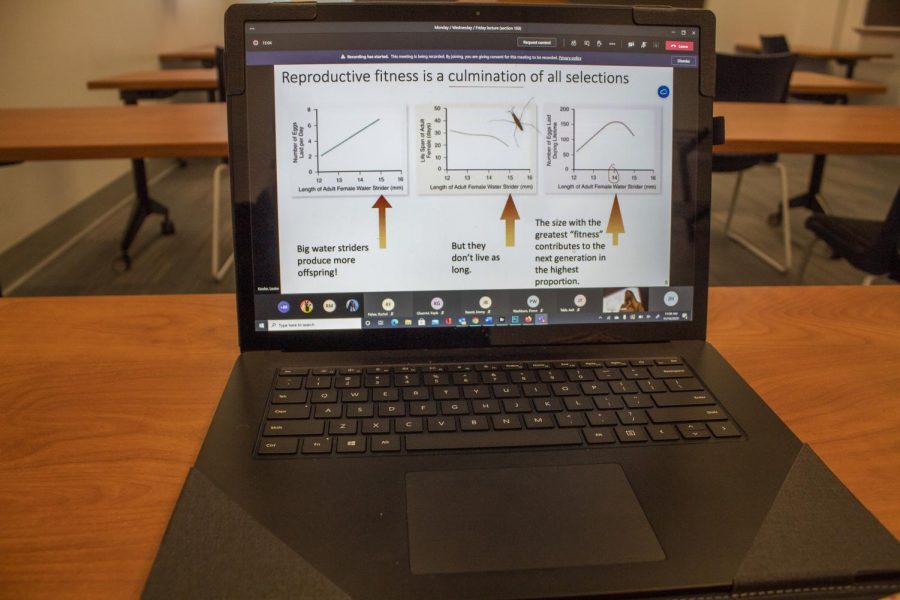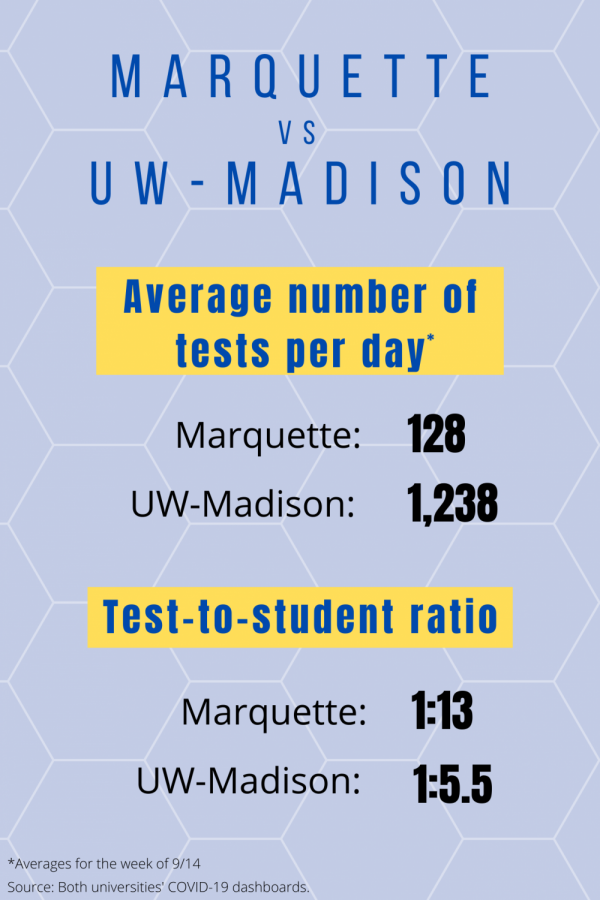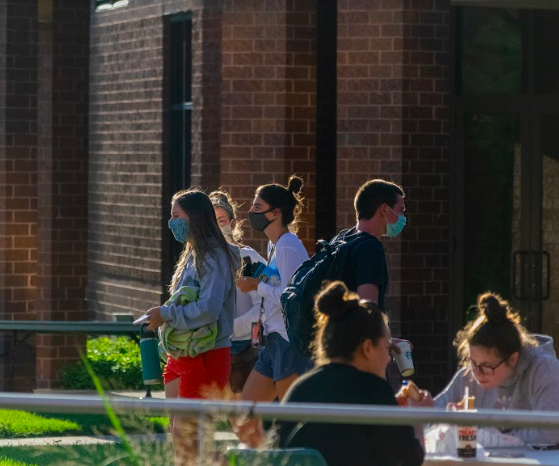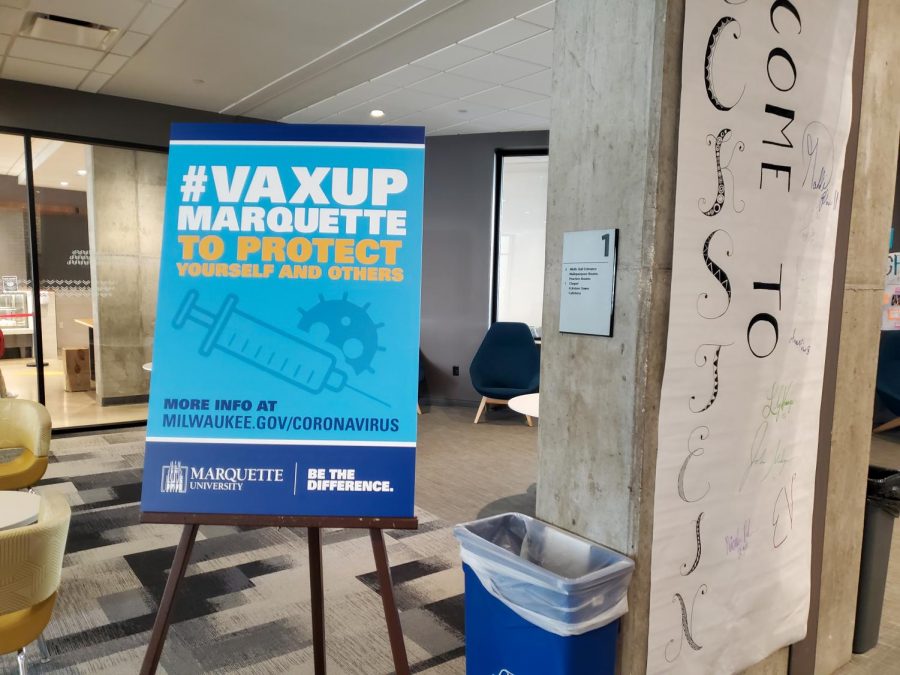The Marquette University coronavirus dashboard website has been updated to reflect new features such as alert levels, risk level criteria and COVID-19 tests and results.
The dashboard was last updated Sept. 4. As of Sept. 7, there are 23 COVID-19 cases on campus. Four are faculty/staff members and 19 are students. Five students tested positive Sept 7. This is the highest number of total cases the university has seen since classes began Aug. 26.
The university is currently at the “moderate” alert level, which was the level Marquette initially opened at, according to Step 4 of the university’s recovery plan.
Marquette’s Recovery Plan details the university’s plan for safely returning to campus and includes guidelines from Milwaukee and Wisconsin.
The “moderate” alert level includes “rigorous cleaning personal protective equipment protocols” and “low-density instruction,” according to the plan.
The new dashboard displays the number of tests done at the Marquette testing center, which began testing Aug. 24. The numbers on the previous dashboard were based on voluntary self-reported cases.
Marquette’s previous dashboard has since been removed from the website.
Test results from Sept 1., included surveillance testing of student athletes with the NCAA’s guidelines and had two of 362 individuals test positive for COVID-19, which made up 1% of tests. No test result data was available for Saturday and Sunday, as the dashboard is only updated Monday through Friday, excluding holidays. The dashboard was not updated Monday due to Labor Day.
The new dashboard website also includes gating criteria, which is alert-based criteria that rates certain aspects of Marquette’s readiness toward the pandemic. These criteria also mimic the city of Milwaukee’s gating criteria with green, yellow and red symbols to show alert levels, with green indicating safe conditions, yellow indicating moderate conditions and red indicating unsafe conditions.
Currently there are criteria for the amount of time it takes to get a test result, percentage of tests that are positive cases, percentage of quarantine space that are available, states of personal protective equipment supply for on-campus health workers and percentage of positive cases who are interviewed for contact tracing within 24 hours of testing positive.
“An average over time … tracks overall trends and is more representative of viral activity than single day fluctuations,” Keli Wollmer, director of the Marquette Medical Clinic, said. “If the percent positive is consistently high, this could indicate that not enough testing is being performed.”
Wollmer also said that getting results back to students within 72 hours is important to establish well-working contact tracing.
Currently, it takes 24 to 48 hours to get tests results back through the on-campus medical clinic, but it can take up to 72 hours.
“If test results are taking greater than 72 hours, the benefit of contact tracing starts to diminish,” Wollmer said.
Students on campus like Girogia Cozzo, a sophomore in the College of Health Sciences, are happy with the fact that the dashboard is keeping the community informed.
“I appreciate the goal of the dashboard as far as keeping the Marquette community informed,” Cozzo said. “I do wish it was updated slightly more frequently.
Cozzo also says it would be “incredibly helpful” to the Marquette community to have a metric that measures the number of recovered cases on campus, alongside those who are already confirmed cases.
“I’m currently not too worried about the number of cases I’ve been seeing on the dashboard. I hope that the Marquette community is able to keep that number under control, ” Cozzo said. “I think we as students need to remember we are guests in (Milwaukee) and by disregarding measures we are putting an entire community … at risk.”
Cozzo also hopes that professors continue to remind students not to come to class if they’re feeling unwell in any matter.
“I think that there should be an increase in the level of testing done on the students,” Gary Weisling, a sophomore in the College of Communication, said. “For Marquette to be truly ahead of the curve when it comes to managing COVID-19, I think they got to ramp testing up to grow their small sample sizes.”
The medical clinic only tests symptomatic cases and has done on average about 15 cases a day, excluding NCAA surveillance testing, since the dashboard started counting cases.
This story was written by Benjamin Wells. He can be reached at [email protected].

